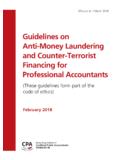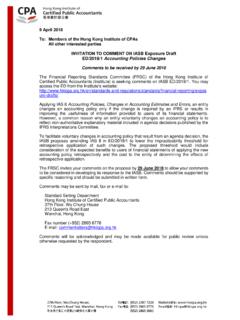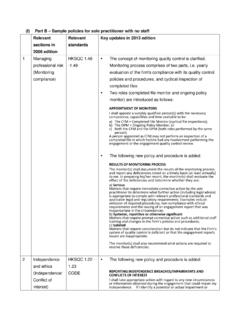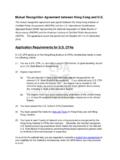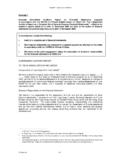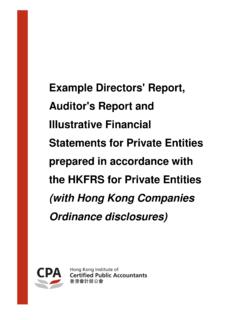Transcription of Hong Kong Financial Reporting Standards for …
1 hong kong Financial Reporting Standards for private entities ("HKFRS for private entities "). This Questions and Answers (Q&As) below have been developed by the Financial Reporting Standards Committee ("FRSC") of the hong kong Institute of Certified Public Accountants (the Institute) and is for general guidance only. The HKICPA, FRSC and their staffs do not accept any responsibility or liability in respect of the Q&As and any consequences that may arise from any person acting or refraining from action as a result of any materials in the Q&As. Members of the HKICPA and other users of this Q&As should also read the original text of HKFRS for private entities , as found in the HKICPA Members' Handbook ( ) for further reference and seek legal advice where necessary when applying the guidance within this Q&As.
2 The Institute's Standard Setting Department welcomes your comments and feedback on this paper, which should be sent to Introduction 1. The Institute adopted HKFRS for private entities as a Reporting option for entities in hong kong which have no public accountability on 30 April 2010. The objective is to ease the Reporting burden of eligible entities by relieving them of the requirement to apply full hong kong Financial Reporting Standards ("HKFRSs"). 2. With the adoption of HKFRS for private entities as a Reporting option, the scope and applicability of the existing HKFRSs and Small and Medium-sized Entity Financial Reporting Framework and Financial Reporting Standard ("SME-FRF&FRS") remain unchanged.
3 entities are not required to adopt HKFRS for private entities even if they are eligible to do so. 3. Eligible entities are permitted to use HKFRS for private entities to prepare their Financial statements for any Financial period ( even if the Financial period ends on or before the date of adoption of HKFRS for private entities by the Institute, which is 30 April 2010). General Guidance included in the literature of HKFRS for private entities 4. As stated in paragraphs and of HKFRS for private entities , the Standard is intended for use by private entities and private entities are defined as entities that: (a) do not have public accountability, and (b) publish general purpose Financial statements for external users.
4 Examples of external users include owners who are not involved in managing the business, existing and potential creditors, and credit rating agencies. 5. As defined in paragraph of HKFRS for private entities , an entity has public accountability if: (a) its debt or equity instruments are traded in a public market or it is in the process of issuing such instruments for trading in a public market (a domestic or foreign stock exchange or an over-the-counter market, including local and regional markets), or (b) it holds assets in a fiduciary capacity for a broad group of outsiders as one of its primary businesses. This is typically the case for banks, credit unions, insurance companies, securities brokers/dealers, mutual funds and investment banks.
5 6. Paragraph of HKFRS for private entities further clarifies that some entities may also hold assets in a fiduciary capacity for a broad group of outsiders because they hold and manage Financial resources entrusted to them by clients, customers or members not involved in the management of the entity. However, if they do so for reasons incidental to a primary business (as, for example, may be the case for travel or real estate agents, schools, charitable organisations, co-operative enterprises requiring a nominal membership deposit, and sellers that receive payment in advance of delivery of the goods or services, such as utility companies), that does not make them automatically publicly accountable.
6 7. The Basis for Conclusions, specifically paragraphs BC55 to BC80, have documented the IASB's view and thought process on the applicability of the standard. General principle of applicability of HKFRS for private entities 8. The FRSC is of the view that entities should go through the thought process described below in determining whether or not they are eligible to use HKFRS for private entities . Statutory Financial Reporting requirement 9. There may be statutory requirements for an entity to prepare its accounts in accordance with specific accounting requirements. For example: the Education Bureau ("EB") requires the accounts of schools (including both Incorporated Management Committee ("IMC") schools and non-IMC schools) to be prepared in accordance with its Code of Aid and other related accounting instructions.
7 10. The entity should identify whether any specific statutory Financial Reporting requirements applies. The entity can use HKFRS for private entities to prepare its accounts for statutory purpose, provided it has no public accountability after considering the entity-specific facts and circumstances. However, the entity should also follow the relevant statutory requirement in preparing its accounts for statutory purposes. 11. Statutory requirements may require an entity to prepare Financial statements which give a true and fair view. For example: the Building Management Ordinance (BMO). requires the Management Committee ("MC"), or a professional property manager employed by the Owners' Corporation ("OC") or its MC, to prepare the annual Financial statements which give a true and fair view of the Financial transactions and Financial position of the OC.
8 12. As stated in paragraph of HKFRS for private entities , the application of HKFRS. for private entities , with additional disclosure when necessary, is presumed to result in Financial statements that achieve a true and fair view of the Financial position, Financial performance and cash flows of private entities . The FRSC is of the view that an eligible entity can use HKFRS for private entities to prepare its general purpose Financial statements, for the purposes of a relevant statute which requires the entity to prepare general purpose Financial statements which are true and fair. Other arrangements 13. There may be other arrangements in place, apart from statutory requirements, which require an entity to prepare Financial statements in accordance with a specific set of accounting Standards (for example: full HKFRSs).
9 There may be specific provisions in an entity's memorandum and articles of association, in business or shareholder agreements or other documents requiring the entity to apply a specific set of accounting Standards to prepare its Financial statements. Eligible entities should consider such other arrangements in determining whether or not to use HKFRS for private entities to prepare their general purpose Financial statements. Commonly asked questions regarding applicability of HKFRS for private entities Q1: Is HKFRS for private entities applicable to Financial institutions? A1: As stated in paragraph BC59 of the Basis for Conclusions, the primary business of banks, insurance companies, securities brokers/dealers, pension funds, mutual funds and investment banks is to hold and manage Financial resources entrusted to them by a broad group of clients, customers or members who are not involved in the management of the entities .
10 This means that such an entity acts in a public fiduciary capacity, and therefore it is publicly accountable. Hence, it is the view of the FRSC. that HKFRS for private entities is not applicable to Financial institutions and entities mentioned above. Q2: Is HKFRS for private entities applicable to companies limited by guarantee or unlimited companies? A2: A company limited by guarantee refers to a company whose members' liability is limited to such an amount as they have undertaken to contribute to the assets of the company in the event of winding up and an unlimited company refers to a company whose members' liabilities are not limited. It is the view of the FRSC that being a company limited by guarantee or an unlimited company in itself would not expressly make that company a private Entity.

